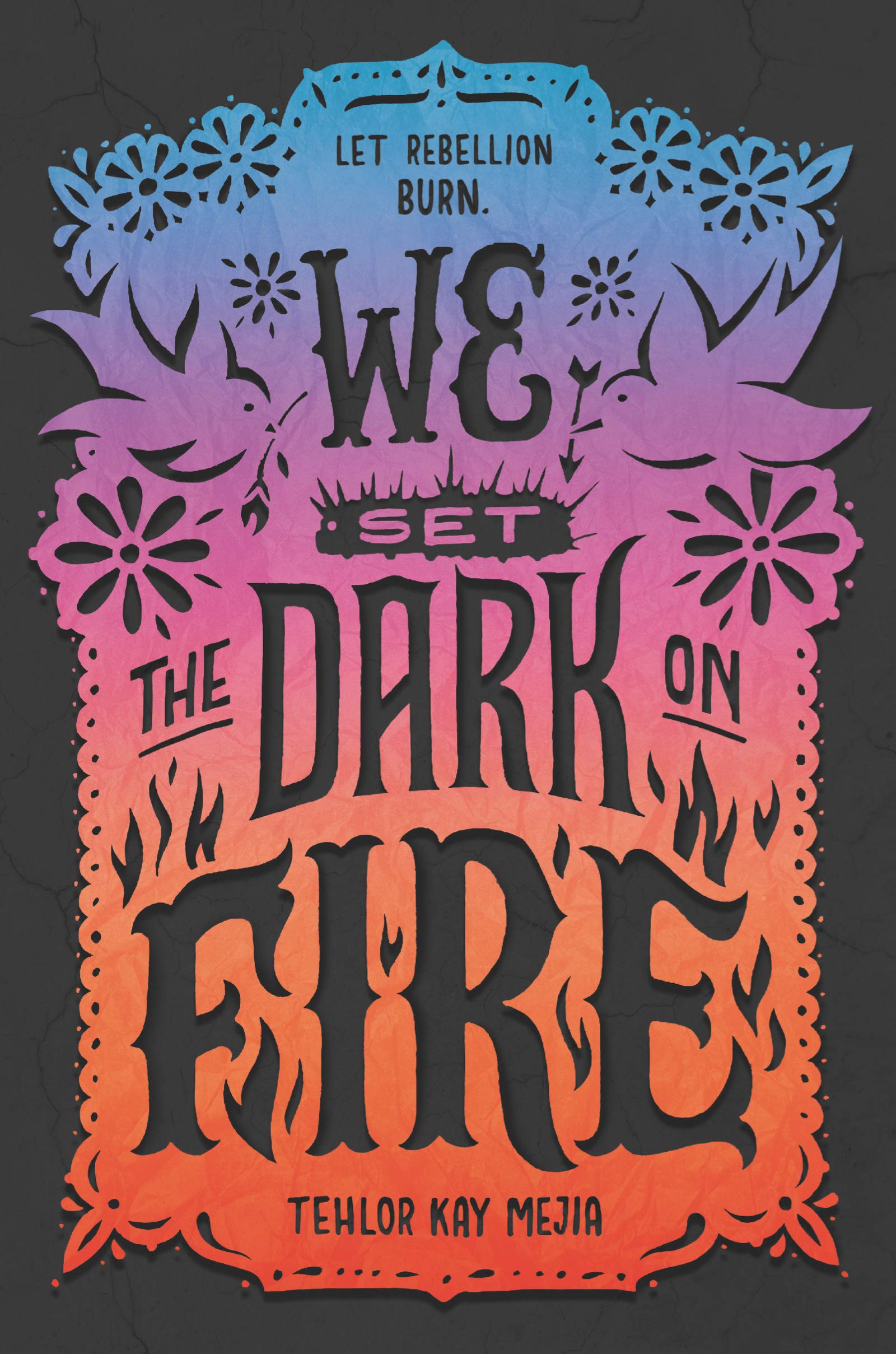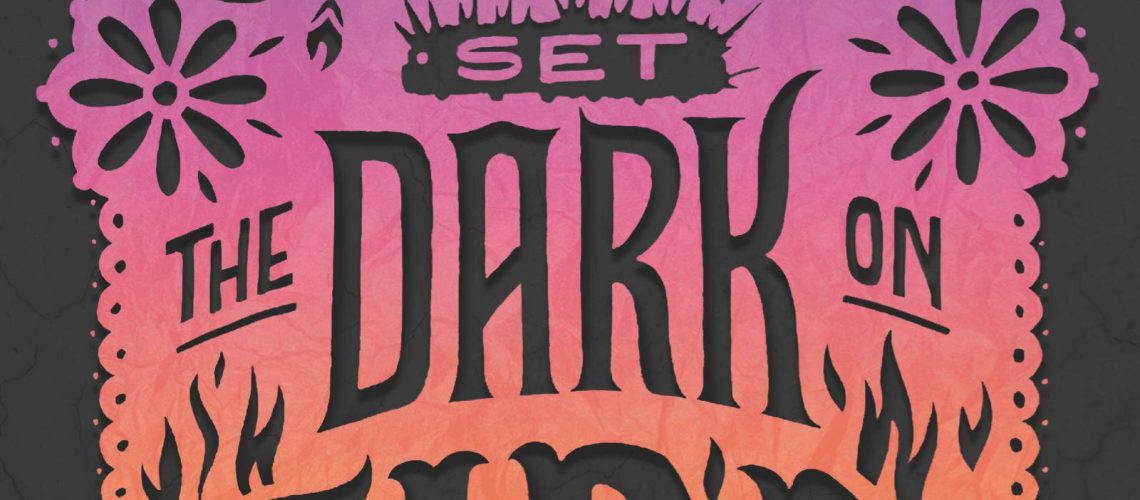We Set the Dark on Fire, Tehlor Kay Mejia’s debut YA fantasy novel, is lush, lyrical, and sure to take the YA world by storm. Intensely descriptive and emotional, every page of this novel is a journey along a path of conspiracy and doubt, told through the eyes of a young woman who is desperate to find herself a secure place in a world that has been set against her since birth. This contemporary Latinx fantasy is a must-read for fans of dystopian worlds where badass women break social norms for the betterment of their people while celebrating their home culture in rich detail.
The novel, set on a fictional version of the Philippine island of Medio, follows Daniela Vargas, a top student at the Medio School for Girls, where distinguished young women are raised and trained to be dutiful wives to their future husbands. Daniela, however, has a secret — she has been lying to everyone about her pedigree, her identity a forgery obtained by her parents to give their daughter a better life. When Daniela is chosen as the Primera for a rising political star, she must maintain her careful facade or lose everything. But when everything seems to go wrong at the last minute, Daniela finds herself facing a hard choice: become a spy for the revolution and be part of her people’s salvation or cling to the dream her parents had for her when they sent her to the capital.

This beautiful Latinx story captured my heart and imagination, and it drew me in with its rhapsodic descriptions of food, culture, and fond memories. Daniela’s life is complicated, but Mejia takes the time to let readers enjoy the little things that occupy the world — from the fresh fruit to the marketplace, from the revolutionaries to the children, and from tarot cards to everyday magic. Mejia’s own life and culture are the heart of this book, and it takes the whole work to another level. Mejia has said that a lot of the activism in this book is based on her own experiences, and her reflections are fascinating because they address various privileges and the complications that come from pretending to be more than you are. Daniela’s own place in this society — an illegal immigrant trying desperately to find a place in her new home — makes this book a commentary on current social issues, while also queering the narrative.
The nature of the society in her book was also something I found very compelling. This novel is set somewhere similar to Earth, but in Daniela’s world, high society — the society she has been working so hard to belong in — is ruled by units of three. Each high-society man has two wives, a Primera and a Segunda. The Medio School for Girls is meant to train young women into these roles through years of hard education. The Primera — Daniela’s path — is the solid partner to their husband, half of their uncompromisable public unit. The Segunda is the child-bearer of the family, the emotional and loving partner. Strictly divided by training, bearing, and world-views, Daniela and her husband’s Segunda, Carmen, are as different as any two people could be. But Daniela, faced with the cold shoulder approach of her husband, finds comfort in the unlikeliest of places and finds herself falling for someone society says she never should. The strict gender roles further separate the women who are confined within them, painting the world in a frustrating binary that Daniela finds herself trapped within. This is a queer book, and Daniela’s burgeoning attraction to another woman places her at odds with what she has grown up believing. The strict triad and societal rules have Daniela skirting the edges of the revolution even before she realizes how deep she is.
Daniela is unique in her place, an undercover element in a high-functioning society that prides itself on their relationship to the god that blessed them. Where Medio and its people believe in the Sun God, Daniela was raised to believe in the thousands of gods and goddesses that reside everywhere in her world, in her breath and soul and in the leaves and rivers and everything else in between. This colors the novel, imbuing her descriptions of her scenery and even her own emotions with the beautiful magical realism of Latinx cultures. Daniela’s story parallels a lot of what is happening in our own world. She’s in the country illegally, under an almost constant threat of discovery, manipulated and alone. Her story is one of immigration and social revolution, and calls on readers to recognize the injustices that are so prevalent in her world while brutally comparing them to those in our own. While the island of Medio is real, Mejia’s novel is dystopian, and the society that Daniela lives in is fictional. But its roots are real, and Daniela occupies a unique space in its culture and growing social revolution.
Throughout the book, Daniela is set onto a path that she did not choose willingly but has grown into as she has grown into her own person, outside of her girlhood school and her tempered emotions. The emotional journey of this novel is its defining tone and burns like the fire the book is named for. Readers ride the highs and lows of Daniela’s life as a strong Primera and a growing young woman who is doubting herself. With every success, Daniela finds herself struggling with her sense of self and her growing sexuality. And with every low, Daniela rises stronger, trusting herself as she moves through a world full of intrigue and difficult choices. The relationship between Daniela and Carmen, her husband’s other wife, is a rollercoaster of emotion. Their clashing identities and style make for a strong core dynamic that defines the rest of the book. And the obvious queer aspects that come from such opposite identities are exciting and genuinely enjoyable.
This book is marketed as LGBT+, and the f/f relationship is a heartwarming journey of self-discovery and exploration that is made all the better by the cultural implications that Mejia insinuates. In another separation of culture, Medio is strictly defined by their ideals of marriages, where Daniela’s natural country is described as more free and accepting. Mejia’s clear distinction between these cultures is another, very real look at our own society and how it is evolving from the old to the new. Daniela’s journey is at once deeply personal and revealing, and that dichotomy makes for a book you won’t want to put down. With a cliffhanger that left me reeling with unexpected bombshells and passionate confessions, Mejia sets the stage for a stunner of a series. I eagerly await the next book, and hope for more revolution and fiery romance. Mejia is a rising star, and her work is sure to inspire further exploration of culture and fantasy, people’s lives, and people’s desire to move forward to a better life.
We Set the Dark on Fire was published on February 26, 2019 by the Katherine Tegen Books imprint of HarperCollins Publishers. It can be found where all good books are sold.







